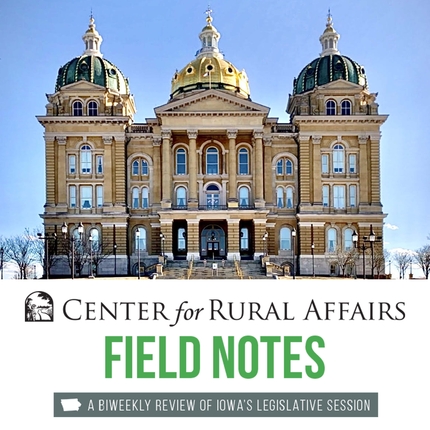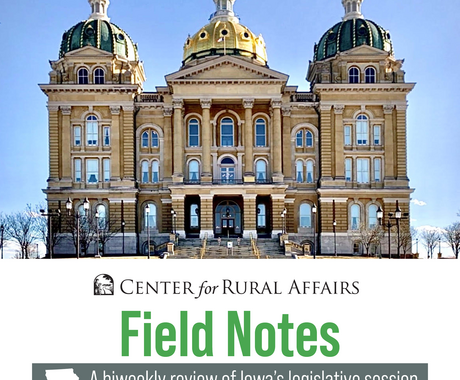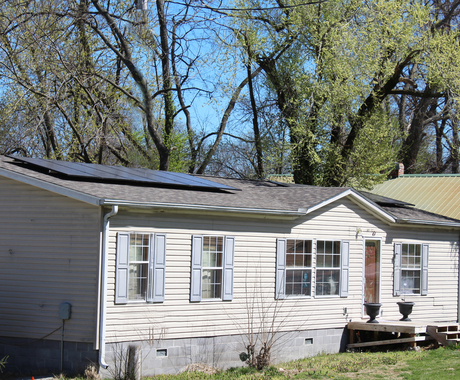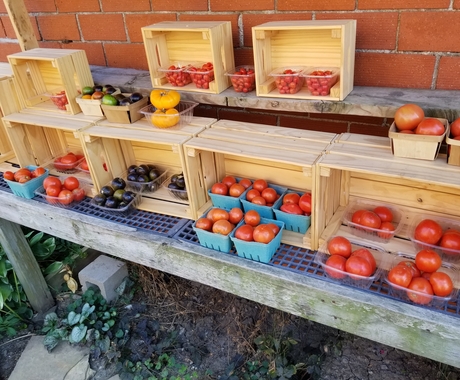By Kate Hansen, former staff member
We’re about a month into the 2023 Iowa legislative session. Lawmakers have continued to stay busy with bill introductions, committee and subcommittee meetings, and debates.
In recent weeks, our staff has weighed in on several issues, including solar energy, soil health, and local foods. We’re closely watching the ongoing effort to create statewide energy siting standards, which are favored by renewable energy developers. We are presenting our voluntary siting matrix proposal to lawmakers as a suitable alternative that can strike a balance between regulatory certainty and local control.
We’re also monitoring legislation relating to water quality funding and the ability of a pipeline company to survey private land.
If you have any questions or would like to share the rural issues that are important to you, please do not hesitate to reach out to me at info@cfra.org or 515.215.1294.
Thank you for making your rural voice heard.
Water quality
Senate Study Bill (SSB) 1052—For: Introduced by Senate Local Government Chair Jesse Green, this bill would designate certain county flood mitigation activities as essential county purposes. Specifically, the legislation names reconnection of floodplains, and wetland and oxbow lake restoration. A subcommittee for the bill met Jan. 23 and recommended its passage. The legislation now heads to the full Senate Local Government Committee.
Senate File (SF) 34—Against: Introduced by Senate Local Government Chair Jesse Green, this bill would prohibit counties and cities from adopting, enforcing, or otherwise administering regulations on stormwater that exceed or conflict with federal or state regulations. We are concerned about this legislation’s potential implications for local control. It was assigned a subcommittee on Jan. 11, but a meeting has not yet been scheduled.
House Study Bill (HSB) 113/SSB 1115—Undecided: Proposed by the Iowa Department of Agriculture and Land Stewardship, this legislation relates to programs and regulations administered and enforced by the department. The legislation encompasses multiple content areas, and one section proposes to make changes to the dynamics of Water Quality Initiative funding between agriculture infrastructure projects and urban infrastructure projects. We are gathering information about the changes proposed in this section to better understand their potential impact. In the House, the bill’s subcommittee met on Feb. 2 and recommended its passage. In the Senate, the bill’s subcommittee is scheduled to convene Feb. 8 at 1 p.m.
Renewable energy
SSB 1077–Against: Introduced by Chairperson Dawn Driscoll in the Senate Agriculture Committee, this bill would create statewide siting standards for solar development on agricultural land, unless the land is at least 150 feet from the nearest adjacent landowner and 1,200 feet from the nearest residence or livestock facility. The bill’s subcommittee met on Jan. 30 and recommended an amendment and passage. The Center opposes the legislation because it sets unworkable siting standards and removes local control. Our staff provided a verbal comment during the subcommittee meeting and advocated for an alternative approach of implementing a voluntary siting matrix.
SF 198—Against: Introduced by Senate Commerce Committee Chair Waylon Brown, this bill would remove a requirement placed on public utilities that own electric generation facilities fueled by coal to file biannual updates to their plan and budget for managing regulated emissions. Instead, the legislation would allow the affected utilities to have the sole discretion in filing updates to this plan, which would reduce oversight from the Iowa Utilities Board (IUB) to control the cost to ratepayers. Formerly SSB 1043, the bill was approved by the Senate Commerce Committee on Feb. 2.
SSB 1059—For: Introduced by Senate Commerce Committee Chair Waylon Brown, this bill addresses the same section and process as SF 198, however, it requires all public utilities that own electric generating facilities to be included in the process. It also features the addition of an integrated resource plan that would be filed biannually to the IUB. This would force the utility to report the projected resources used to meet demand, the source of that energy, lower-cost strategies, and alternate planning scenarios. Should SF 198 pass, it would make this bill moot. The bill was referred to the Senate Commerce Committee and assigned to a subcommittee. On Jan. 25, the bill was tabled until a future meeting.
SF 2—Against: Introduced by Sen. Brad Zaun, this bill would create a statewide siting standard for wind energy systems that includes a minimum setback distance of 5,000 feet from existing non-participating dwellings and property lines. The bill would remove local control from county governments and create an unworkable setback standard, limiting economic opportunities for rural communities. The legislation was filed in the Senate Commerce Committee and assigned to a subcommittee. A meeting has not been scheduled.
SSB 1085—Undecided: Introduced by Senate Commerce Committee Chairperson Waylon Brown, this bill states that a county or a city cannot adopt an ordinance, motion, resolution, or amendment that limits consumer access to an energy source or contributes to the prohibition of the sale or production and the infrastructure necessary to provide consumer access. An energy source is defined as any fuel or power source used to operate an engine including any type of fossil fuel, hydrogen, natural gas, and electricity used for charging vehicles. The bill was assigned to a subcommittee, which is scheduled to meet Feb. 7 at 3:30 p.m.
Other bills of interest
HF 69—For: Introduced by Rep. Norlin Mommsen and referred to the House Agriculture Committee, this legislation would make updates to the Soil and Water Conservation chapter of Iowa State Code. The bill would allow soil and water conservation districts to broaden their purview by prioritizing soil health and carrying out water quality protection projects within their jurisdiction. It would also allow soil and water conservation districts to partner with a private entity to help fund these projects. On Jan. 30, the bill’s subcommittee recommended its amendment and passage. Center staff was present and provided suggestions for its improvement, including additions to a list of conservation practices to include rotational grazing and extended crop rotation.
SF 134/HF 80—For: Introduced in both the House and Senate, this legislation would shift farmers market licensing requirements from a county basis to a statewide basis. Presently, vendors are required to pay an annual $150 license fee to sell at farmers markets on a county basis. To sell in multiple counties, one must pay multiple county fees. This legislation would institute a single statewide annual fee of $150, reducing barriers for agricultural producers and small business owners to widely market their products. Our staff supported the legislation at subcommittee meetings in the Senate and House on Jan. 24 and 25, respectively. The House subcommittee recommended its passage. Formerly SSB 1040 in the Senate, an amendment was filed for SF 134 on Jan. 30, intending to bring temporary food establishments into the fold. On Feb. 1, its Senate subcommittee recommended its amendment and passage.
SF 102—Monitoring: Introduced by Sen. Jeff Taylor, this bill would repeal the ability of a pipeline company to survey private land with a 10 days written notice. The bill was introduced in the Senate Commerce Committee and assigned to a subcommittee, but no meeting has been scheduled yet.





